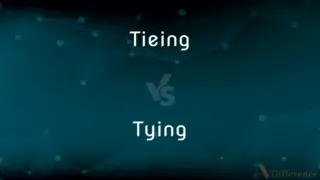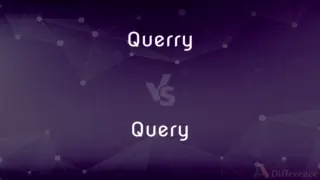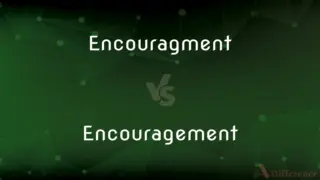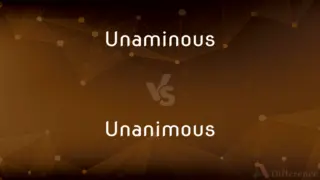Speaked vs. Spoke — Which is Correct Spelling?
Reviewed by Tayyaba Rehman — By Fiza Rafique — Updated on March 25, 2024
"Speaked" is an incorrect spelling. "Spoke" is the correct past tense form of the verb "speak", meaning to communicate verbally.
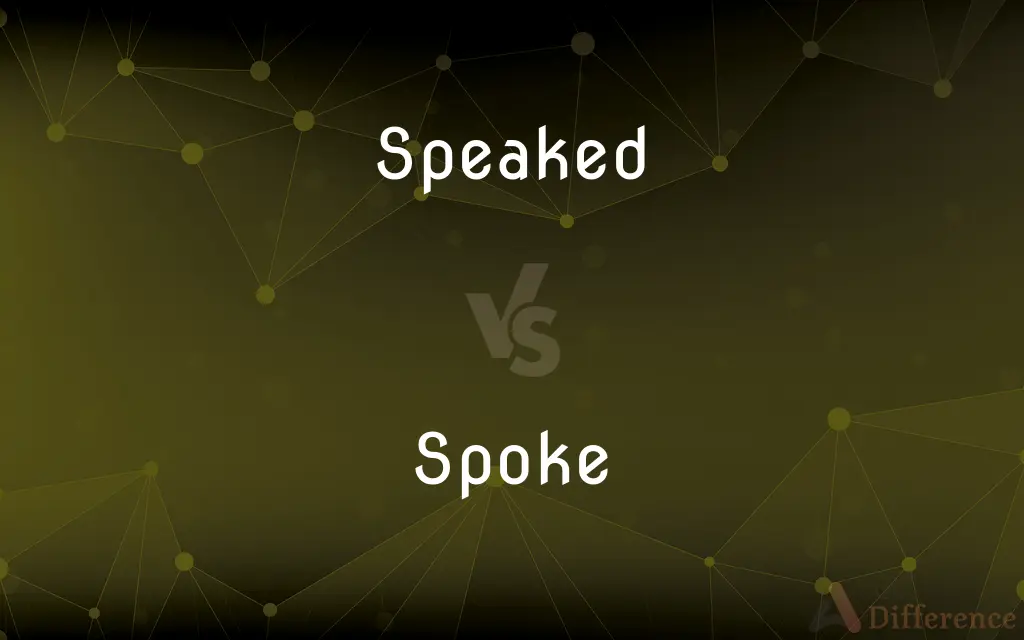
Table of Contents
Which is correct: Speaked or Spoke
How to spell Spoke?

Speaked
Incorrect Spelling

Spoke
Correct Spelling
ADVERTISEMENT
Key Differences
Use a mnemonic: "He spoke, but never 'speaked'."
Recall this sentence: "Yesterday, I spoke to her."
Think of "spoke" as the past of "speak", similar to "broke" being the past of "break".
Remember that many verbs in English have irregular past forms.
"Spoke" rhymes with "choke" and "broke".
ADVERTISEMENT
How Do You Spell Spoke Correctly?
Incorrect: Yesterday, he speaked about his experiences abroad.
Correct: Yesterday, he spoke about his experiences abroad.
Incorrect: She speaked clearly and confidently in front of the crowd.
Correct: She spoke clearly and confidently in front of the crowd.
Incorrect: They have never speaked in such a formal setting before.
Correct: They have never spoken in such a formal setting before.
Incorrect: We speaked to the manager about our concerns last week.
Correct: We spoke to the manager about our concerns last week.
Incorrect: He speaked too quickly for me to understand.
Correct: He spoke too quickly for me to understand.
Spoke Definitions
Spoke refers to the past action of conveying information verbally.
He spoke to her about the changes.
Spoke can mean expressing oneself using words.
She spoke eloquently at the conference.
Spoke might denote a specific manner of speaking.
He spoke loudly to be heard over the noise.
Spoke can imply having a conversation.
I spoke with the manager about my concerns.
Spoke, as a noun, can refer to a rod connecting the center of a wheel to its rim.
One of the bicycle spokes was broken.
A spoke is one of some number of rods radiating from the center of a wheel (the hub where the axle connects), connecting the hub with the round traction surface. The term originally referred to portions of a log that had been riven (split lengthwise) into four or six sections.
One of the rods or braces connecting the hub and rim of a wheel.
(Nautical) One of the handles projecting from the rim of a ship's steering wheel.
A rod or stick that may be inserted into a wheel to prevent it from turning.
A rung of a ladder.
To equip with spokes.
To impede (a wheel) by inserting a rod.
Past tense of speak.
(Archaic)A past participle of speak.
A support structure that connects the axle or the hub of a wheel to the rim.
(nautical) A projecting handle of a steering wheel.
A device for fastening the wheel of a vehicle to prevent it from turning when going downhill.
One of the outlying points in a hub-and-spoke model of transportation.
(transitive) To furnish (a wheel) with spokes.
The radius or ray of a wheel; one of the small bars which are inserted in the hub, or nave, and which serve to support the rim or felly.
A projecting handle of a steering wheel.
A rung, or round, of a ladder.
A contrivance for fastening the wheel of a vehicle, to prevent it from turning in going down a hill.
To furnish with spokes, as a wheel.
Support consisting of a radial member of a wheel joining the hub to the rim
One of the crosspieces that form the steps of a ladder
Spoke Meaning in a Sentence
The children spoke excitedly about their holiday plans.
The president spoke about the new policy in his address.
He spoke on behalf of the team, expressing their gratitude.
He spoke with authority, convincing everyone in the room.
The lawyer spoke clearly, laying out the facts of the case.
He spoke at length during the meeting, explaining his plan.
They spoke of their memories, filled with nostalgia.
The guest speaker spoke about overcoming challenges.
She spoke to him in Spanish, and he responded in kind.
They spoke against the proposed changes, arguing for alternatives.
The activist spoke out against injustice.
He spoke fondly of his mentor, who had inspired him greatly.
She spoke about her research at the international conference.
They spoke directly to the concerns of the community.
She spoke up for those who couldn't speak for themselves.
The guide spoke about the history of the landmark with great knowledge.
The novelist spoke at the library about her writing process.
She spoke to the customer service representative for an hour.
He spoke of a time when things were simpler.
Spoke Idioms & Phrases
Spoke too soon
Made a statement that proved to be premature or incorrect.
I said the weather was going to be great, but I spoke too soon; it started raining.
Spoke the same language
Had similar thoughts, opinions, or values.
Even though we come from different backgrounds, we spoke the same language when it came to our goals.
Spoke volumes
Provided a lot of information or revealed something significant, often without words.
His silence spoke volumes about his disagreement.
Spoke out of turn
Said something that was not appropriate for the situation, often because it was not one's place to speak.
I may have spoken out of turn by suggesting a solution before hearing everyone else's ideas.
Spoke highly of
Expressed a good opinion or gave praise to someone or something.
She always spoke highly of her colleagues, emphasizing their contributions.
Never spoke a truer word
Said something that is absolutely true.
When he said that hard work pays off, he never spoke a truer word.
Common Curiosities
What is the verb form of Spoke?
"Spoke" is itself a verb, being the past tense of "speak".
Which vowel is used before Spoke?
The letter "o" is the vowel before "spoke".
Why is it called Spoke?
"Spoke" is the past tense form of the verb "speak", originating from Old English "spæc".
Which preposition is used with Spoke?
Prepositions like "to", "with", or "about" can be used with "spoke".
What is the singular form of Spoke?
"Spoke" is singular.
Which conjunction is used with Spoke?
Any conjunction can be used with "spoke", depending on the sentence; e.g., "and", "but", "or".
What is the pronunciation of Spoke?
"Spoke" is pronounced as /spoʊk/.
What is the root word of Spoke?
The root word is "speak".
What is the plural form of Spoke?
If considering the noun form (wheel part), the plural is "spokes".
Is Spoke an abstract noun?
No, "spoke" is not an abstract noun.
Is Spoke a countable noun?
Yes, especially when referring to the parts of a wheel.
Is the Spoke term a metaphor?
"Spoke" can be used metaphorically in contexts like "he was the spoke in the wheel."
Is the word Spoke is imperative?
No, "spoke" is not imperative as it's past tense.
What is a stressed syllable in Spoke?
The entire word "spoke" is stressed since it's one syllable.
What is the opposite of Spoke?
Considering the verb form, "listened" can be an opposite action.
Which determiner is used with Spoke?
Determiners like "the", "my", and "a" can be used with "spoke".
How many syllables are in Spoke?
"Spoke" has one syllable.
What is the second form of Spoke?
The second form (past tense) is "spoke".
Is Spoke a noun or adjective?
"Spoke" can be both a verb (past tense of "speak") and a noun (part of a wheel).
Is Spoke an adverb?
No, "spoke" is not an adverb.
Is the word Spoke is Gerund?
No, "speaking" would be the gerund form.
Is the word “Spoke” a Direct object or an Indirect object?
"Spoke" can serve as a direct object, e.g., "I liked the way he spoke."
How do we divide Spoke into syllables?
"Spoke" cannot be divided as it's a single syllable.
What part of speech is Spoke?
"Spoke" can be both a noun and a verb.
What is another term for Spoke?
Another term for "spoke" (verb) could be "said" or "uttered", and for the noun, "rod" or "bar".
Which article is used with Spoke?
Both "the" and "a" can be used with "spoke", depending on context.
Is Spoke a negative or positive word?
"Spoke" is neutral.
Is Spoke a vowel or consonant?
"Spoke" is a word, not a single letter. It contains both vowels and consonants.
Is Spoke a collective noun?
No, "spoke" is not a collective noun.
What is the first form of Spoke?
The first form (base form) is "speak".
What is the third form of Spoke?
The third form (past participle) is "spoken".
How is Spoke used in a sentence?
"She spoke clearly and confidently in front of the audience."
Share Your Discovery
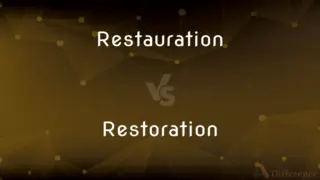
Previous Comparison
Restauration vs. Restoration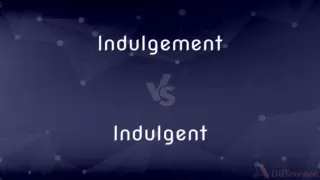
Next Comparison
Indulgement vs. IndulgentAuthor Spotlight
Written by
Fiza RafiqueFiza Rafique is a skilled content writer at AskDifference.com, where she meticulously refines and enhances written pieces. Drawing from her vast editorial expertise, Fiza ensures clarity, accuracy, and precision in every article. Passionate about language, she continually seeks to elevate the quality of content for readers worldwide.
Reviewed by
Tayyaba RehmanTayyaba Rehman is a distinguished writer, currently serving as a primary contributor to askdifference.com. As a researcher in semantics and etymology, Tayyaba's passion for the complexity of languages and their distinctions has found a perfect home on the platform. Tayyaba delves into the intricacies of language, distinguishing between commonly confused words and phrases, thereby providing clarity for readers worldwide.

